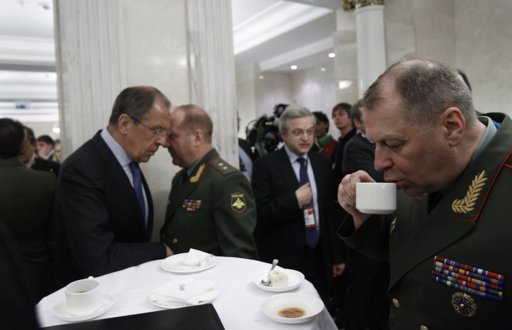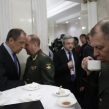
Moscow Conference Ponders Eurasian Security Challenges
Publication: Eurasia Daily Monitor Volume: 10 Issue: 103
By:

The May 23 Moscow conference on “Military and Political Aspects of European Security,” hosted by the Russian Ministry of Defense, saw an interesting admixture of old and new thinking on seminal Eurasian security questions. Little progress can be expected in reducing Russia’s and the North Atlantic Security Treaty’s (NATO) differences concerning the military issues, but opportunities for mutually beneficial cooperation are present in the political areas (This author attended the conference).
The Russian officials who spoke at the conference generally expressed pessimistic and familiar views regarding the United States’ ballistic missile defense (BMD) system, NATO’s membership enlargement and military presence in former Soviet bloc countries, the civil war in Syria, the Conventional Armed Forces in Europe (CFE) Treaty, the Organization for Security and Cooperation in Europe (OSCE), and the prerequisites for strategic and tactical nuclear arms control (see EDM, May 28). They repeatedly complained about the alliance’s failure to take into account Russian concerns when making policy decisions, insufficient NATO cooperation with Moscow in pursuit of common interests, and needless NATO distrust of Russia.
But Russian officials and non-governmental experts also offered positive assessments regarding possible cooperation with NATO on other issues, including Eurasian security relating to post-2014 Afghanistan and countering Islamist terrorism in Eurasia. In his welcoming message to the 200–300 conference attendees, President Vladimir Putin noted improvements in Russian-NATO relations in several areas, from renewed exchanges and joint exercises to cooperation regarding Afghanistan. Putin and other Russian officials attributed this progress to the absence of fundamental ideological differences between Russia and the West, the rise of multipolarity, the successful functioning of some arms-control agreements, expanding socioeconomic ties between Russia and the West, and mutual threats and interests (Russian defense ministry website, https://mil.ru/konf_evrodefence/material_appearance.htm, accessed May 30).
The head of the Presidential Administration, Sergei Ivanov, complained that some Western countries use “double standards” to judge international terrorism, such as their support for armed militants fighting the government of Syria. Ivanov also believed that Russia and NATO could cooperate more effectively in Afghanistan if the North Atlantic Alliance would collaborate directly with the Collective Security Treaty Organization (CSTO), a bloc of Moscow-leaning Eurasian countries that, in addition to Russia, includes Armenia, Belarus, Kazakhstan, Kyrgyzstan and Tajikistan.
Nonetheless, the Russian and Western speakers agreed that Afghanistan has been an important area of Russian-NATO cooperation in recent years and that this collaboration is likely to continue even as the Alliance-led International Security Assistance Force (ISAF) draws down its presence in Afghanistan. For example, Deputy Defense Minister Anatoly Antonov told an international security forum in Geneva last month that, “One can predict, with a high degree of probability, heightened terrorist activity after [the ISAF] military presence in this country is reduced” (Russian defense ministry website, https://mil.ru/konf_evrodefence/material_appearance.htm, accessed May 30).
At the Moscow conference, Russian Defense Minister Sergei Shoigu cited international terrorism rather than NATO as the main threat to Russia’s security, as well as international stability more generally. He endorsed the French military intervention in Mali and stressed the importance of Russia and the West working to keep weapons of mass destruction out of the hands of terrorists. Lieutenant General Igor Sergun, the head of Russia’s military intelligence, told the attendees that European converts to Islam now fighting with the insurgents in Syria would likely return to their home countries and potentially engage in terrorism in Europe. Similarly, in Afghanistan, he warned that, “A diversified terrorist network, including suicide bomber training camps, has already been established in the country” by the Taliban, who could send their experienced foreign militants “to other hot spots across the world” (RIA Novosti, May 23). Nikolai Bordyuzha, the CSTO general secretary, also predicted that the security of Russia’s southern borders would decrease following the end of ISAF’s mission next year. Earlier this month, Russia’s Ambassador to Afghanistan said that his government was still considering deploying its Border Troops back to Tajikistan to help that country, which borders Afghanistan, deal with the resurgence of Eurasian terrorism (RIA Novosti, May 17).
The Central Asian countries, which sent their defense ministers or other senior officials to the Moscow conference, are particularly eager to sustain some NATO security assistance for their governments as well as the Afghan National Security Forces in coming years. Russian officials are not averse to such cooperation in principle even if they object to some specific initiatives, such as NATO’s plans to transfer excess defense items from their forces in Afghanistan to some Central Asian countries, who normally obtain their military equipment from Russia. Given what happened after their former east European allies joined NATO and reequipped their Soviet-supplied armed forces with Western weapons, Russian experts fear that such transfers, which would likely occur at below market cost to the recipients, will undercut their own arms sales and the resulting leverage Moscow holds over the receiving governments, as well as make the Central Asian militaries depend more on NATO’s good will for future defense supplies (Author’s interviews at the conference site).
A key theme of the Russian presentations at the conference was their fundamental dissatisfaction with how today’s NATO-dominated European security structure does not accord Russia sufficient influence given Moscow’s great power status and its large stake in Eurasian security developments. To address this problem, Russian Foreign Minister Sergei Lavrov called on NATO governments to sign the draft European security treaty released by the Russian government several years ago. Western leaders have dismissed the draft treaty as being impractical and unnecessary, but Lavrov insisted that the proposal “remain on the agenda” because it was essential to make the general agreements on the indivisibility of security contained in OSCE declarations and other documents more specific, concrete and legally binding in the form of a draft treaty (Russian defense ministry website, https://www.mid.ru/brp_4.nsf/0/CD8E25B5082A4EEA44257B750033BBF1, accessed May 30).
NATO Secretary General Anders Fogh Rasmussen, who is visiting Washington today (May 31), will likely discuss these issues in his meetings with President Barack Obama and other senior US officials. Obama and Putin have exchanged letters through their national security advisers in recent weeks, affirming a desire to cooperate further on security issues (Moscow Times, May 23). In the near term, Afghanistan and Central Asia look to be the most promising areas for Russia-NATO cooperation, given shared Russian and NATO concerns that the region will see a revival of Islamist terrorism there as Western combat troops continue their withdrawal.




